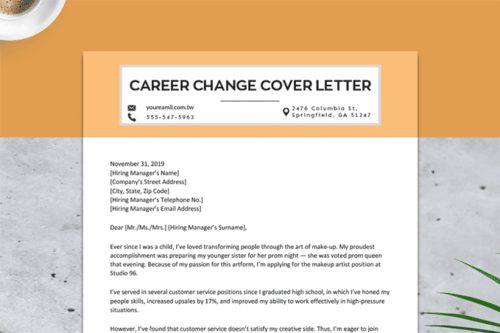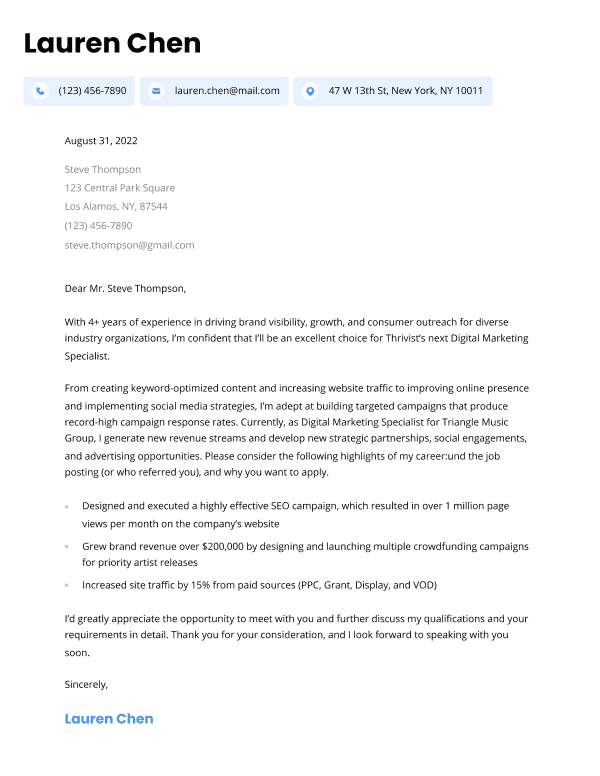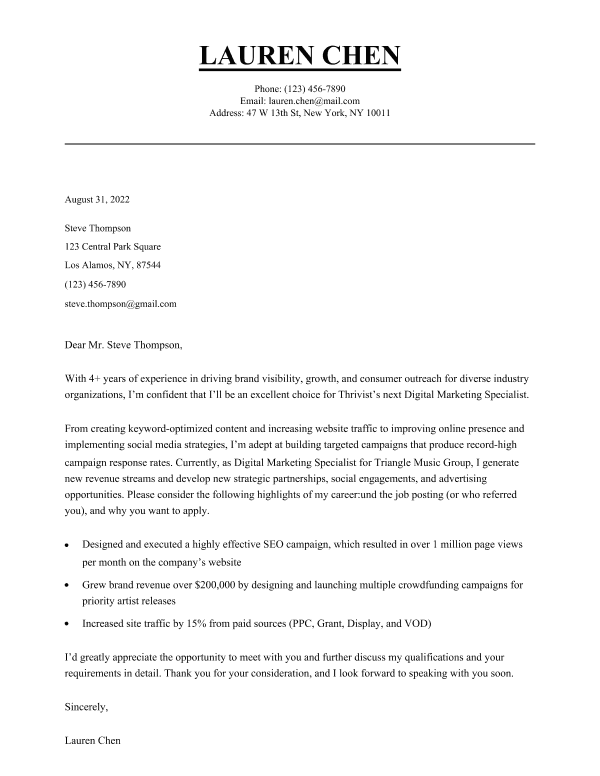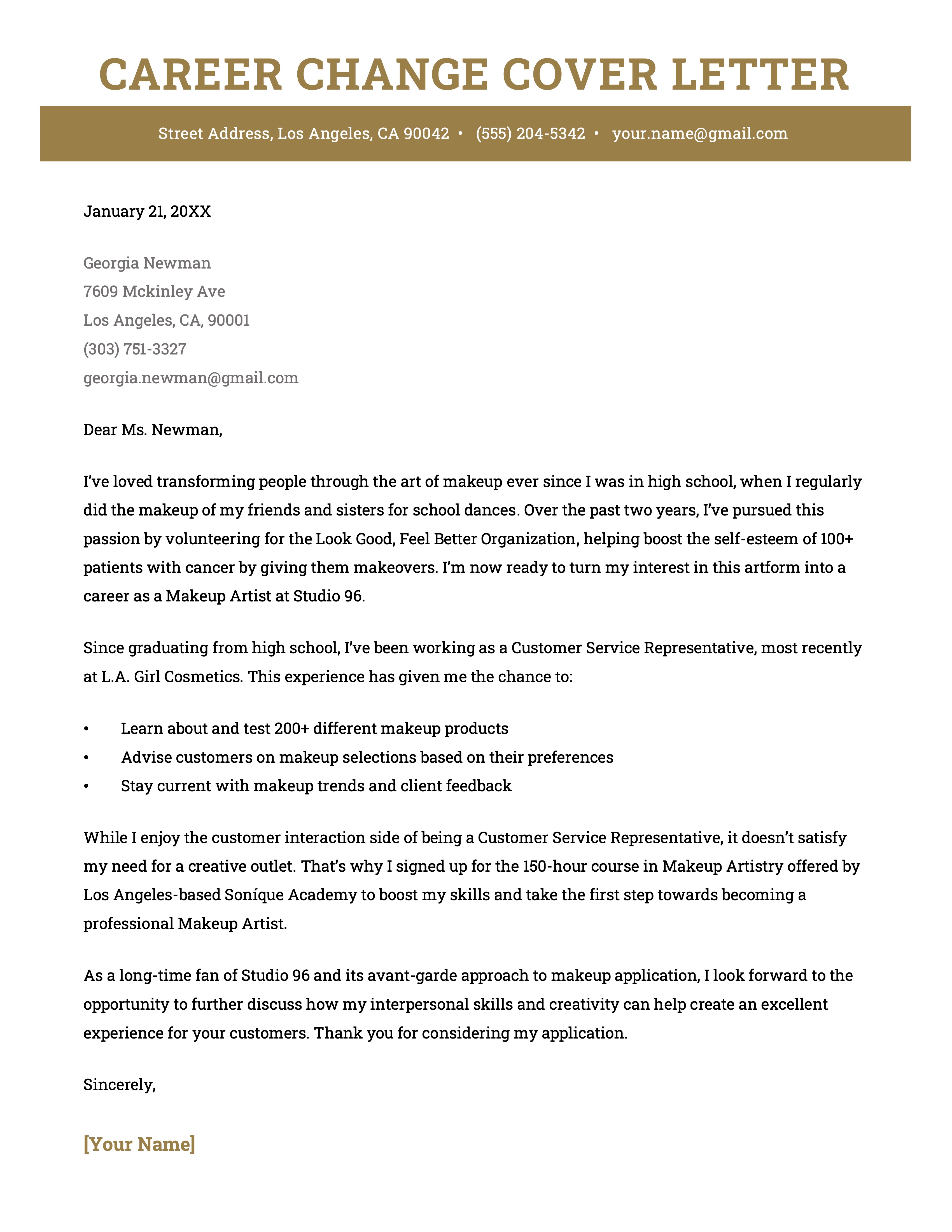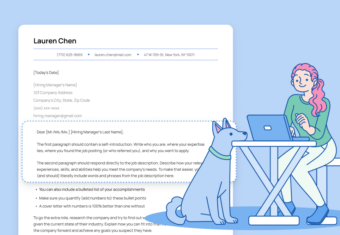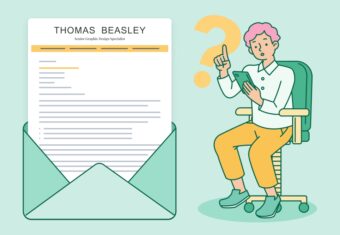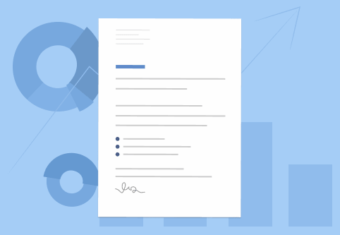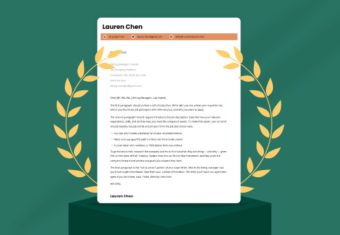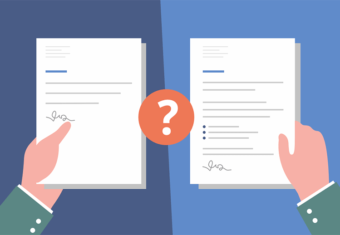Check out our career change cover letter example and the four tips below to learn how to write a cover letter that convinces hiring managers that you’re the best fit for the job.
Our free-to-use cover letter builder can make you a cover letter in as little as 5 minutes. Just pick the template you want, and our software will format everything for you.
Career Change Cover Letter Sample
This career change cover letter example was written by our experts to give you an idea of what yours should look like.
4 Tips for writing a cover letter for a career change
To convince employers that you’re ready to make a career change, your cover letter needs to display your transferable skills, explain the reason behind your career change, and prove that you’ll be a valuable asset to their team.
Follow these four tips for writing a cover letter that will help you succeed in your career transition:

Dread writing cover letters? Read our guide to learn how to write a great cover letter that convinces hiring managers you’re the ideal person for the job.
1. Write an attention-grabbing introduction
Hiring managers have a limited amount of time to spend on each job application. If you start your cover letter by drawing attention to your lack of experience and stating “I may be unqualified, but…” , you risk making a negative impression on employers before they get the chance to learn why you’re the right candidate for the job.
Instead, you want the introduction of your cover letter to immediately give hiring managers a reason to consider your application by highlighting either:
- Any relevant qualifications you have.
- Your passion for your new career
Below is a good example of a resume introduction for a career change cover letter:
Ever since I helped my younger sister prepare for her prom night, I’ve loved transforming people through the art of makeup. Over the past two years, I’ve pursued this passion by volunteering for the Look Good, Feel Better Organization where I’ve helped boost the confidence of 100+ patients with cancer by giving them makeovers. I’m now ready to turn my interest in this art form into a career as a Makeup Artist at Studio 96.
2. Highlight your transferable skills
When you’re switching careers, it’s especially important that your cover letter conveys that you possess the skills required to do the job.
According to Caroline Castrillon, an experienced career and leadership coach, highlighting your transferable skills is the key to writing a strong career change cover letter:
The cover letter is the perfect place to address a career change because you can tailor it to address why your current experience is valuable and relevant to the job and the company. The key is to highlight transferable skills which allow you to make an immediate impact in almost any field.
Caroline Castrillon, Career and Leadership Coach at Corporate Escape Artist
Rather than focus on your lack of work experience, use your cover letter to focus on the transferable skills you picked up at your last job (or in other parts of your life) that will make you a great addition to your new workplace.
Not sure what skills to highlight? No problem. Here are some versatile examples of soft skills to include in your career change cover letter:
- Communication skills (verbal, written, and listening)
- Leadership skills
- Critical thinking
- Adaptability
- Teamwork
- Interpersonal skills
- Ability to work independently
- Creativity
- Time management
- Public speaking
You may also have technical skills that you can transfer to a new field. For instance, if you have experience with certain computer programs, note them on your resume and elaborate on them in your career change cover letter.
Some transferable hard skills you could mention in your cover letter include:
- Data analysis
- Agile project management
- Budget management
- Research skills
- Technical writing
- Adobe Creative Cloud
- Coding skills
- Microsoft Office
- Collaboration tools (Slack, Trello, Microsoft Teams)
- Language skills
Additionally, you should highlight any industry-specific technical skills you’ve picked up that are directly relevant to the job you want. For example, if you’re transitioning into a career in software development, be sure to mention any coding classes you’ve taken, whether through a university program or online.
When you write your cover letter, be clear and concise about your skills and how they translate to the open position.
3. Explain your career change
Employers know that hiring someone who’s in the process of a career change is a risk. Your cover letter is the perfect opportunity to convince them that you’re the right candidate for the job, and that hiring you is worth taking a chance.
To make sure you appear fully committed to your new career, be honest in your cover letter about why you’re changing industries. Tell the story behind how you discovered your passion, and emphasize any relevant experience you have.
Remember: relevant experience doesn’t have to be work-related, it can also be:
- Volunteer work
- Online courses
- Personal projects
By explaining the reason for your career change and discussing the steps you’ve already taken to prepare for your new career, you’re showing employers that you’ve put thought into your decision.
If you’re planning to move during your career change, you’ll need to persuade the hiring manager that the move is permanent with a relocation cover letter.
4. Show how you can help the company reach its goals
While employers love candidates who are passionate about their careers, to land interviews you also need to show them how their company stands to benefit from your career transition.
You’ll be up against candidates who might’ve worked in the industry for years, so your cover letter needs to convince hiring managers that you’d be a strong fit for the job despite your gap in experience.
The best cover letters are tailored to showcase your knowledge about the company. You should always research an organization before applying to a job, but it’s especially important to do your research when writing a cover letter for a career transition.
Learn about the company’s values, past projects, and mission statement. When you write your cover letter, mention these points and how your skills and personal qualities will help you contribute to the further success of the company.
Here’s an example of a career change cover letter closing paragraph to show you how to convince employers that you understand the company and its needs:
As a long-time fan of Studio 96 and its avant-garde approach to makeup application, I look forward to the opportunity to further discuss how my interpersonal skills and creativity can help create an excellent experience for your customers. Thank you for considering my application.
Click to rate this article
4.3 Average rating


